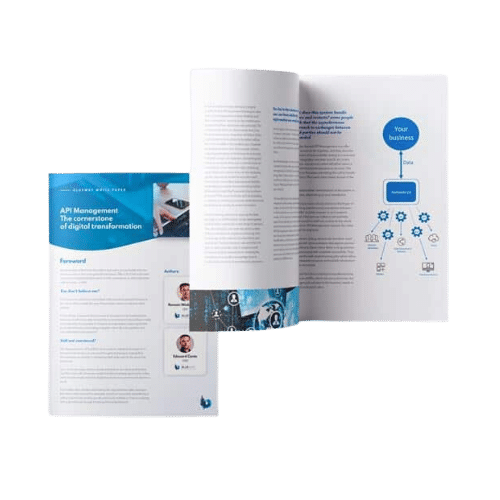Expose data more quickly, but always retain control
Data interchange between business partners is increasingly necessary. As the volume of data exchanged shoots upwards, the need for standardisation becomes more pressing.
Making data available by means of APIs is the method adopted by a growing number of businesses. APIs simplify data interchanges with partners, and ultimately benefit the entire ecosystem: customers, subcontractors, suppliers, etc. Openness of this sort does however need a strategy, including standardisation and careful coordination to ensure it becomes a performance driver for all parties.
When it is properly managed and kept as simple as possible, data exposure means:
- Collaboration and mutual data enrichment by stakeholders
- Straightforward access to data
- Regulated access and use of standards to keep the data and services exposed secure
- Data exposure management throughout the data lifecycle
- The ability to offer added-value services
Ecosystem partners (and their developers), who are the major users of APIs, need to be able to evolve independently of each other. All businesses will be striving, at any given moment, to understand the scope of consumption of each of their APIs, to check consumption quality and ease of access, and to keep data traffic secure.

Download our white paper on API Management
Understanding API gateways
An API gateway plays a centralisation role, for both the business and its partners. By unifying all the company’s APIs at a single point, the gateway makes connections and data exposure easier to manage. For developers, the gateway provides access to a full range of APIs, the consumption of which can easily be monitored throughout their lifecycle by means of appropriate KPIs. An API gateway not only simplifies connections and supplies key integration information, but also allows developers to select the APIs they want to use completely independently. The gateway’s ease of use means that developers and partners are both more engaged and more effective.
An API gateway provides a range of secure, available, services to developers, and it includes an API catalogue, the possibility of testing and consuming APIs as needed, plus close contact with other developers and access to best practices to streamline the entire process. APIs are in this way akin to products, very easy to select and deploy for custom development purposes.

Download our expert view on the complementary use of ESB and APIM solutions.
API Management and API gateways: positioning and benefits
The API gateway is itself part of a more comprehensive solution, namely API Management. A gateway that meets not only the need for administration of the various APIs used, but also offers a complete environment for testing, storing contractual information, and monitoring consumption.
API Management is used to manage APIs throughout their lifecycle, and offers a clear picture of how they are consumed. This solution helps to improve the quality of service delivered to ecosystem partners. API Management provides data security for the company that owns the data. Secure data processing, protection for test environments, a continuous check that SLAs are being met… With the volume of data exchanged, strict control over exposure is indispensable.
API Management meets the needs of the business and its partners:
Partners
- Complete information about the APIs consumed and statistics, simplified access to tokens
- Secure testing environments
- High availability of environments and scalable services
- Possibility of making use of large quantities of data
- Space for developers to work and exchange both data and ideas independently, with all the information needed to deploy APIs effectively
Business
- Global monitoring of all APIs
- Control over the consumption and technical health of APIs
- Options for mouse-controlled (not coded) creation of custom API bundles for each partner
- Straightforward and quick data openness
- Secure data interchange, processing and production environments
API Management consequently meets the requirements of the majority of public- and private-sector organisations alike. Examples include various local authorities wanting to open up their data to start-ups as a source of innovation, retailers demanding real-time data interchanges with their transportation networks, and manufacturers needing to process data from multiple smart objects.
Our API Governance module is fully integrated with the Data Foundation technical base and the other modules of our Phoenix data platform. Consequently, you create APIs in Data Foundation and expose them with API Governance !

Want to discuss API Management with an expert ?


